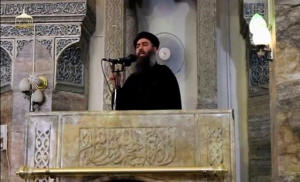|
Russia's military says it may have killed
IS leader; West, Iraq skeptical
 Send a link to a friend
Send a link to a friend
 [June 17, 2017]
By Dmitry Solovyov and Ahmed Rasheed [June 17, 2017]
By Dmitry Solovyov and Ahmed Rasheed
MOSCOW/BAGHDAD (Reuters) - Moscow said on
Friday its forces may have killed Islamic State leader Abu Bakr
al-Baghdadi in an air strike in Syria last month, but Washington said it
could not corroborate the death and Western and Iraqi officials were
skeptical.
The secretive Islamic State leader has frequently been reported killed
or wounded since he declared a caliphate to rule over all Muslims from a
mosque in Mosul in 2014, after leading his fighters on a sweep through
northern Iraq.
If the report does prove true, it would be one of the biggest blows yet
to Islamic State, which is trying to defend its shrinking territory
against an array of forces backed by regional and global powers in both
Syria and Iraq.
But in the absence of independent confirmation, some U.S. officials said
U.S. agencies were skeptical of the report. Several Iraqi security
officials said Iraq was doubtful as well.
"His death has been reported so often that you have to be cautious till
a formal Daesh statement comes," a European security official said,
using an Arabic acronym for the group.
U.S. Navy Captain Jeff Davis, a Pentagon spokesman, said: "We have no
information to corroborate those reports."
A senior Trump administration official noted “a number of infirmities”
in the reports, which have given U.S. officials reason to question their
accuracy.

“Some of those infirmities suggested that this happened at the end of
May and that there were upwards of 300 or more soldiers killed in that
strike,” said the official, who asked not to be identified.
“A strike of that size and that claim that would have happened that long
ago without any knowledge is something that made me curious,” the
official added.
The Russian Defence Ministry said on its Facebook page that it was
checking information that Baghdadi was killed in the strike on the
outskirts of Raqqa in Syria, launched after Russia received intelligence
about a meeting of Islamic State leaders.
"On May 28, after drones were used to confirm the information on the
place and time of the meeting of IS leaders, between 00:35 and 00:45,
Russian air forces launched a strike on the command point where the
leaders were located," the statement said.
"According to the information which is now being checked via various
channels, also present at the meeting was Islamic State leader Abu Bakr
al-Baghdadi, who was eliminated as a result of the strike," the ministry
said.
OPERATING CAUTIOUSLY
However, a colonel with the Iraqi national security service told Reuters
Baghdadi was not believed to have been in Raqqa at the time of the
strike in late May. One of Baghdadi's aides may have been killed rather
than Baghdadi himself, the colonel said.
He said that Baghdadi was believed to be operating cautiously in the
border area between Iraq and Syria with just a handful of close aides,
and avoiding using telecommunications equipment to evade surveillance.
Another Iraqi intelligence official said the Russians had not shared any
information with Iraqi authorities to indicate Baghdadi was killed. Iraq
was checking the report and would announce his death if it received
"solid confirmation".
Hoshiyar Zebari, a long-serving former Iraqi foreign minister and now a
senior adviser to the government of the Kurdish autonomous region, also
told Reuters there was no confirmation of Baghdadi's death.
The Russian defense ministry statement said the strike was believed to
have killed several other senior leaders of the group in addition to
Baghdadi, as well as around 30 field commanders and up to 300 of their
personal guards.
[to top of second column] |

A man purported to be the reclusive leader of the militant Islamic
State Abu Bakr al-Baghdadi making what would have been his first
public appearance, at a mosque in the centre of Iraq's second city,
Mosul, according to a video recording posted on the Internet on July
5, 2014, in this still image taken from video. REUTERS/Social Media
Website via Reuters TV/File Photo

The IS leaders had gathered at the command center, in a southern
suburb of Raqqa, to discuss possible routes for the militants'
retreat from the city, the statement said.
The United States was informed in advance about the place and time
of the strike, the Russian military said.
CLOSE TO DEFEAT
Islamic State fighters are close to defeat in the twin capitals of
the group's territory, Mosul in Iraq and Raqqa in Syria, after
nearly three years ruling over millions of people in a wide swathe
of territory in both countries.
Russia supports the Syrian government of President Bashar al-Assad,
which is fighting against Islamic State fighters, one front in a
multi-sided civil war. The United States supports Kurdish and Arab
fighters in Syria who are separately planning an assault on Raqqa.
In Iraq, the U.S.-backed government has been battling to recapture
Mosul since October last year after driving the group out of most of
the rest of the territory it had seized.
The last public video footage of Baghdadi shows him dressed in black
clerical robes declaring his caliphate from the pulpit of Mosul's
medieval Grand al-Nuri mosque back in 2014.
Born Ibrahim al-Samarrai, Baghdadi is an Iraqi in his mid-forties,
who broke away from al Qaeda in 2013 after years participating in
the insurgency against U.S. forces in Iraq and the Iraqi government.
The U.S. State Department has offered a $25 million reward for
information leading to his arrest.
A number of senior IS figures have been killed in air strikes or
special forces raids since the United States launched its campaign
against the group in 2014, including Baghdadi's deputy Abu Ali
al-Anbari, the group's "minister of war" Abu Omar al-Shishani, and
its media director Abu Muhammad al-Furqan.

Rami Abdulrahman, director of the Syrian Observatory for Human
Rights, cast doubt on the report Baghdadi may have been killed. He
said that according to his information, Baghdadi was located in
another part of Syria at the end of May.
“The information is that as of the end of last month Baghdadi was in
Deir al-Zor, in the area between Deir al-Zor and Iraq, in Syrian
territory,” he said by phone.
(Additional reporting by Polina Devitt in Moscow, Tom Perry in
Beirut, and Steve Holland aboard Air Force One; Writing by Dmitry
Solovyov, Christian Lowe and Peter Graff; Editing by Peter
Millership and James Dalgleish)
[© 2017 Thomson Reuters. All rights
reserved.]
Copyright 2017 Reuters. All rights reserved. This material may not be published,
broadcast, rewritten or redistributed. |